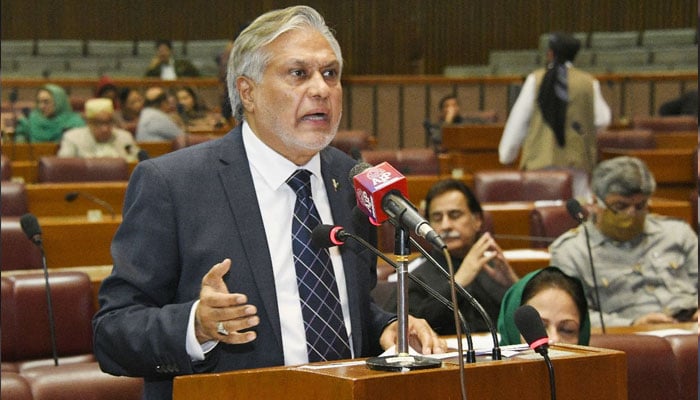NA stamps IMF-influenced mini-budget
MNAs approve Finance (Supplementary) Bill 2023 with majority votes amid no presence of major opposition lawmakers
The National Assembly on Monday approved the Finance (Supplementary) Bill 2023 for the remaining four months of the fiscal year 2022-23 as Finance Minister Ishaq Dar convinced members of the lower house of parliament that the ‘mini-budget’ was the need of the hour.
The finance czar had tabled the bill in the National Assembly and Senate on February 15 with budget proposals presented seeking to fulfil the prerequisites for unlocking the crucial $1.1 billion International Monetary Fund (IMF) loan tranche which will help cushion the country's dwindling economy.
Pakistan is in dire need of funds as it battles a wrenching economic crisis as the State Bank of Pakistan (SBP)-held foreign exchange reserves barely cover one month of imports.
The Finance (Supplementary) Bill 2023 laid in the house last week, brings about an increase in the general sales tax (GST) from 17% to 18% apart from increasing the federal excise duty on sugary items, tobacco, airline tickets, marriage halls, and cement.
The government has already enforced the increase in GST through administrative approval from the federal cabinet. Now, however, it has proposed giving similar powers to the Federal Board of Revenue (FBR).
Dar — while speaking on the floor of the National Assembly — informed the MNAs that a few amendments have been made to the bill which includes an increase in excise duty on business class air travel abroad.
Before the mini-budget’s approval, Dar told the lower house of parliament that the government appreciated recommendations by lawmakers for the bill and thanked the house for participating in the debate regarding the bill. He also said the government considered recommendations shared by the parliamentarians.
The finance czar further added the government introduced the mini-budget following the IMF’s conditions. “We also don’t like imposing taxes. We tried keeping a minimum rate of additional taxes.”
Faced with critically low foreign exchange reserves, the government has already halted most imports — apart from food and pharmaceuticals — but hopes to boost revenue with the broad tax hike.
However, with an election due by the end of the year, the government is reluctant to be too harsh in case it is punished at the polls.
The approved supplementary finance bill that increases sales tax from 17 to 25% on imports ranging from cars and household appliances to chocolates and cosmetics.
People will also have to pay more for business-class air travel, wedding halls, mobile phones, and sunglasses.
A general sales tax was raised from 17 to 18%.
"The prime minister will also unveil (further) austerity measures in the next few days," Dar told the national assembly, adding "we will have to take difficult decisions".
Dar assured the members that the coalition government will meet its annual tax target for the FBR.
The minister agreed that the people are reeling with sky-high inflation but also questioned whether the increase was the result of the decisions taken in the last four months — the time since he’s taken over the reins of Pakistan’s economy.
The senator blamed the previous Pakistan Tehreek-e-Insaf-led administration for ruining the country’s economic state highlighting the way it backtracked from the IMF agreement. “The previous government violated the economic discipline.”
Dar stated that the government is taking all possible steps to ensure economic stability. “We held negotiations with the IMF for 10 days and convinced them to agree on taxes worth Rs170 billion,” he added.
Pakistan is desperate to unlock the next tranche of a $6.5 billion loan facility with the IMF but struggling to meet tough conditions set by the global financier.
The IMF is demanding that Pakistan boosts its pitifully low tax base, end exemptions for the export sector, and raise artificially low energy prices that are meant to help poor families.
— Additional input from AFP
-
Bitwise Crypto Industry innovators ETF: What investors should do in 2026?
-
Nintendo shares slide again as momentum fears grow
-
Gold, silver prices fallen sharply; What’s driving the drop?
-
Gold’s record climb: Experts question if its safety is ‘overstated’
-
Dubai unveils plans to construct street built with real gold
-
Netflix slams Paramount’s bid: 'Doesn't pass sniff test’ as Warner battle escalates
-
Ubisoft: Shares plunge amid restructuring plan and wave of games cancellations
-
Netflix revises Warner Bros. deal to $83 billion: All-cash offer












